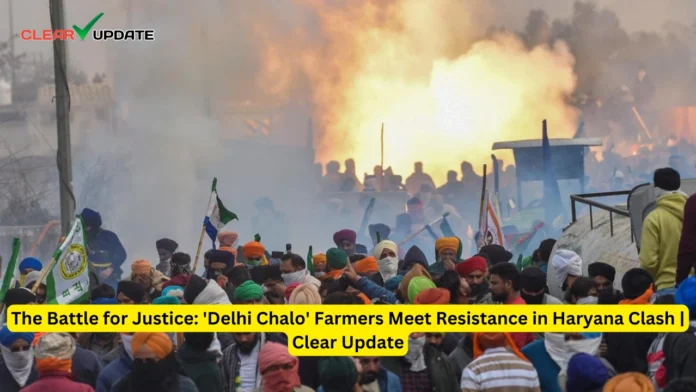Delhi Chalo
The “Delhi Chalo” farmers’ protest is a recent movement by farmers from Punjab, Haryana, and Uttar Pradesh, who are marching towards Delhi to press for their demands. The farmers are demanding a legal guarantee for the Minimum Support Price (MSP) for their produce, the implementation of the Swaminathan Commission’s recommendations, a full debt waiver for farmers, pensions for farmers and laborers, the withdrawal of cases against farmers from the previous protests, and justice for the victims of the Lakhimpur Kheri violence, among other demands. The protest has led to clashes with the police, and the authorities have fortified the borders of Delhi with heavy barricading to prevent the entry of the protesters. The farmers’ unions leading the protest include the Samyukt Kisan Morcha (Non-Political) and the Kisan Mazdoor Morcha, among others.

The protest comes at a crucial time, just months before national elections in India, and the government has been in negotiations with the farmers, but a consensus has not been reached on all the demands. The farmers’ protest is a continuation of the movement from two years ago, and it is a significant challenge for the governing party and Prime Minister Narendra Modi, who is widely expected to win a third term in the upcoming elections. The farmers’ protest is a response to the government’s failure to meet their key demands from the previous protests, despite the repeal of the controversial agricultural laws in 2021. The demand for a guaranteed Minimum Support Price (MSP) is at the heart of the current protests, as the farmers seek assurance of fair prices for their crops. The protests have led to clashes with the police, and the authorities have taken strict measures to control the demonstrations and prevent the entry of the protesters into Delhi.
Introduction
The ‘Delhi Chalo‘ march initiated by farmers from Punjab has become a focal point in Indian politics, highlighting the issues surrounding minimum support price (MSP) for crops and agricultural reforms. This protest, characterized by its peaceful yet determined nature, has encountered various challenges, including barricades, tear gas shells, and heightened security measures.
The Farmers’ Demands
The primary demand of the protesting farmers revolves around ensuring a legal guarantee for minimum support price (MSP) for crops, based on the Swaminathan formula of C2+50 (input cost of capital + 50 per cent). Additionally, they are advocating for debt waivers, no hike in electricity tariffs, comprehensive crop insurance, and an increase in pensions, among other demands.
Read Also: Uttarakhand Under Fire: The Controversial Shoot-at-Sight Decision | Clear Update
Government’s Response and Security Measures
In response to the ‘Delhi Chalo’ march, the government has deployed riot control vehicles, including water cannons, at various border points in Punjab and Haryana. Security measures have been intensified with multi-layer barricades, concrete blocks, and heightened surveillance. However, clashes between protesters and security personnel have been reported, leading to the use of tear gas shells and water cannons.
Legal Proceedings and Judicial Intervention
The Punjab and Haryana High Court has issued notices to the Centre and the states of Haryana and Punjab in response to petitions filed regarding the farmers’ protest. These legal proceedings aim to address issues such as obstructive actions by the government and ensuring the unhindered flow of traffic on highways.
Political Statements and Future Implications
Political leaders, including Congress president Mallikarjun Kharge, have voiced their support for the farmers’ demands, promising legal guarantees for MSP if their party returns to power. However, the government, represented by Union Agriculture Minister Arjun Munda, emphasizes the need for structured discussions with all stakeholders before implementing laws guaranteeing MSP.
Read Also: Mumbai Police on High Alert: The Mystery of Bomb Threats at 6 Hotspots! | Clear Update
Conclusion
The ‘Delhi Chalo’ march symbolizes the resilience and determination of Indian farmers in fighting for their rights and ensuring the welfare of the agricultural community. As the protest continues to unfold, it remains crucial for all stakeholders to engage in meaningful dialogue to address the concerns raised by the farming community.




